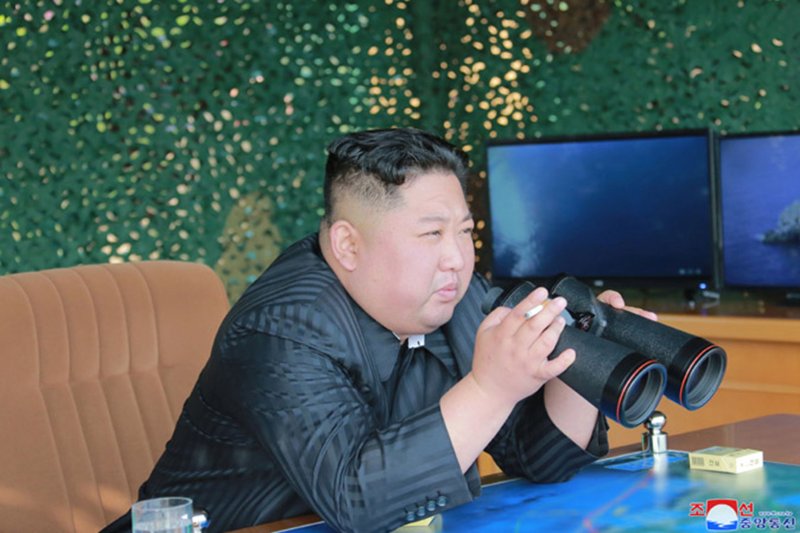1 of 2 | This image released on May 5 by the North Korean Official News Service (KCNA) shows North Korean leader Kim Jong Un supervising a military "strike drill" at an undisclosed location near the East Sea. Photo by KCNA/UPI |
License Photo
SEOUL, May 28 (UPI) -- Stalled North Korean denuclearization talks have the potential to move forward, but U.S. President Trump will need to overrule hard-line voices in his administration, such as national security adviser John Bolton, to make it happen, South Korean and U.S. experts said at a press briefing in Seoul on Tuesday.
"You have a conflict between a group in the State Department that wants to move forward with negotiations and a national security adviser that never saw a negotiation that he wanted to move forward with," said Morton Halperin, former director of policy planning Staff at the State Department.
"We're going to succeed only if President Trump overrules his national security adviser."
During his just-concluded state visit to Japan, Trump parted ways with Bolton and other advisers on how he viewed recent missile launches by North Korea, downplaying their threat.
Trump directly contradicted Bolton, as well as Japanese Prime Minister Shinzo Abe, on Monday, saying that Pyongyang didn't launch ballistic missiles or violate United Nations Security Council resolutions.
"My people think it could have been a violation, as you know. I view it differently," Trump said of the May 4 and May 9 short-range missile launches.
On Saturday, Bolton said that there was "no doubt" that the North violated the resolutions by firing ballistic missiles.
North Korea responded by calling Bolton a "warmonger" on Monday in a statement carried by its state-run Korean Central News Agency.
Moon Chung-in, a special adviser to South Korean President Moon Jae-in, also minimized the North Korean missiles at Tuesday's press briefing.
"I would say that we do not know if they were ballistic or cruise missiles," he said, echoing the vague line that Seoul has taken on the launches.
"But one thing is very clear. It did not go beyond national territorial boundaries, so as President Trump says, I don't think it was provocative enough to involve the U.N. Security Council."
The experts agreed that North Korean leader Kim Jong Un still wants to continue with denuclearization talks.
"I don't think Kim Jong Un has come this far ... to simply walk away and say that's it," said Joseph Detrani, former special envoy to the Six Party Talks, an effort that begin in 2003 to end North Korea's nuclear program through negotiations involving China, the United States, North and South Korea, Japan and Russia.
However, sticking points in negotiations have remained firmly in place since the first Trump-Kim summit meeting in Singapore last June.
That summit produced a declaration that North Korea would work toward a "complete denuclearization of the Korean Peninsula," but details and a timeline for carrying out the agreement are still unclear.
Pyongyang is looking for relief of punishing international sanctions in exchange for steps it has already taken, such as dismantling a nuclear testing site, while Washington has held out for complete denuclearization first.
A second Trump-Kim summit, held in February in Hanoi, Vietnam, concluded abruptly without an agreement.
Bolton said last week that the United States has not had much contact with North Korea since then but that U.S. special envoy to North Korea Stephen Biegun "can't wait to talk to his North Korean counterpart."
The panel discussed a phased approach that would allow for concessions from both sides in a step-by-step process, as well as a move toward normalizing relations, which would be key in building trust and making it more difficult to roll back any progress.
"Historically, the best security assurance is a normal diplomatic relationship with the United States with embassies in our respective capitals," said Detrani, a process he said could first begin with opening liaison offices in both countries.
"And we would move forward with full diplomatic recognition and then access to international financial institutions and foreign direct investment. That would show the lack of a hostile policy," he said.
Halperin added that the definition of denuclearization of the Korean Peninsula may also have to allow a greater level of reciprocity than has been previously discussed.
"it's going to have to be reciprocal, and I think we haven't fully faced up to that," he said. "If we want visits with limited notice on North Korean military bases, we're going to have to agree to inspections with limited notice on South Korean and American military bases in South Korea. For our side, that's a new element, which we need to debate internally and then be ready to accept."
Moon said that it's important to start making tangible progress with steps such as revisiting Kim Jong Un's offer to dismantle the Yongbyon Nuclear Scientific Research Center, the North's main nuclear complex, which he made at the Hanoi summit in February.
"We need success stories with concrete progress," Moon said, to help rebuild momentum and public support for the peace process. "The problem is that they're talking too much. Now is the time to make real and concrete progress."
Halperin said that the State Department is willing to go back to the negotiating table, but that ultimately the decision will have to come from Trump.
"The State Department is pressing for permission to basically accept the framework that the North Koreans put on the table, Yongbyon for sanctions relief," he told UPI. "Not total sanctions relief, but some relief depending on how far they go, how much certification there is, how much the dismantling is not just taking it down but actually blowing it up.
"And I think that's where we should go," he said. "I think the State Department people agree with that. And one day when Mr. Bolton is out, causing trouble someplace else, the president may go ahead and do that."















